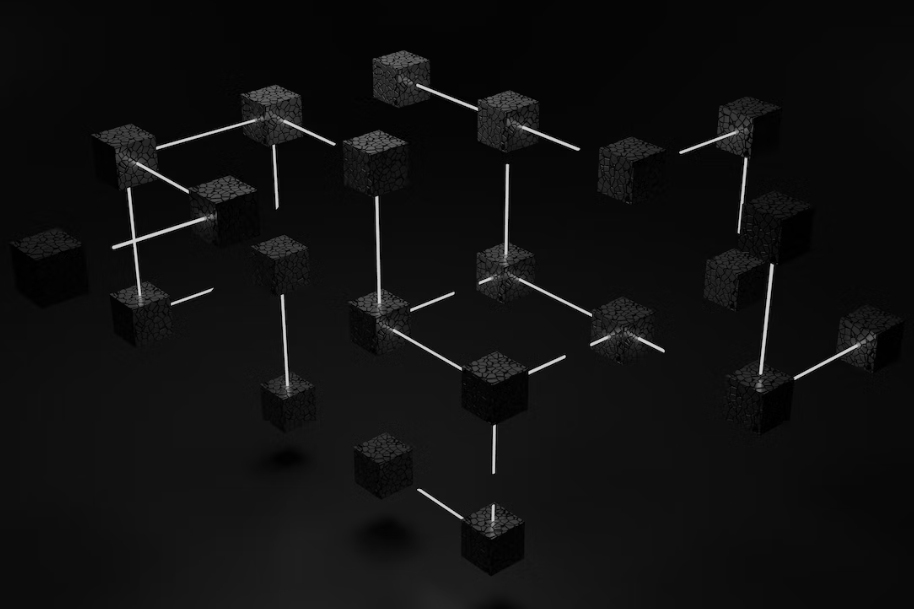It is natural for us to associate blockchains with cryptocurrency. And yes, blockchain technology is crucial in the crypto space, but this is not all it is used for. In fact, blockchains have various applications outside of cryptocurrency. With that in mind, let’s look at the biggest ways blockchain technology is used outside of crypto.
A quick summary of blockchains
Before we get into how blockchains are used outside of crypto, let’s quickly look at what a blockchain is in simple terms.
As the name suggests, a blockchain is a virtual chain of blocks. It helps to think of a blockchain like what you see above: small packets of data collected in a long string. This line forms a database or distributed ledger that is shared across multiple entities worldwide.
Blockchains rely on cryptography to provide a highly secure form of data storage. Using cryptography, data stored in the blockchain is encrypted, making it much more difficult to access and exploit.
So how is this technology used outside of crypto? Which industries are investing in the blockchain?
1. Health services
Blockchain technology can be hugely beneficial in the healthcare sector. A very important practice that healthcare organizations must follow is the secure storage of confidential medical information. This is where blockchains can be useful, as their cryptographic nature allows them to protect data very effectively.
On top of this, blockchain’s distributed ledger technology is useful in transferring data between hospitals, surgeries and other medical locations. While anyone can access public blockchains, private blockchains require authorization. So by using private blockchains, healthcare organizations can safely ensure that data is shared between locations.
Blockchains may also prove beneficial in the healthcare supply chain sector. The transparency provided by blockchains can show every step of a substance or equipment’s shipping process until it is in the building or on the shelf. This also applies to logistics, which we will discuss a little later.
There is now a wide range of blockchain healthcare services on the scene, including EncrypGen, Chronicled and BurstIQ.
2. Identity verification
If you spend time online, you have what is called a digital identity. But it’s now a bit too easy for malicious actors to impersonate you, and online platforms are constantly working to make identity verification much more complex.
On the internet, your personal information is usually stored in a centralized way. But this presents several problems. Centralized systems are vulnerable to technical crashes and malicious takeovers, and they create controversy because they give certain individuals too much power over the platform. On top of this, many people do not have access to a physical form of identification. Blockchain technology can help in both cases by providing a decentralized blockchain identity.
As we already know, blockchains are very secure due to their decentralized nature and use of cryptography. They are also completely digital and can be accessed from anywhere if the individual gains access. By using blockchains, people can store their identity securely, fend off attackers and have digital access to a method of verification. This technology can also give individuals control over how their identifying data is shared.
3. Property
That is correct; blockchains even have applications in real estate! By combining real estate with blockchain technology, high-value physical assets can be traded in the digital realm. Essentially, blockchains can tokenize real estate assets, making them more tradable. This in turn makes it possible for property assets to be traded on stock exchanges.
In addition, real estate trading on the blockchain can cut out middlemen and third parties, such as banks and brokers, reducing fees overall and allowing buyers and sellers to interact and trade directly. This is already the case on many cryptocurrency platforms and is slowly transitioning to other markets as well.
Of course, blockchain technology can also offer higher levels of security and trading of real estate deals, making it a huge plus in many industries.
4. Secure data storage
As cybercrime tactics become increasingly sophisticated, organizations and individuals struggle to keep their data secure. Two-factor authentication, passwords, identity verification and other security measures are known to have been bypassed in cyber attacks, so there is an obvious need for a data storage solution that really works. Enter blockchains.
Again, blockchain technology’s use of cryptography is key here, as it encrypts data for storage. But this is not where things end. The structure of blockchains also plays a role. Because blockchains are decentralized, users can trust them much more, as they do not give power to a single entity and reduce the chances of malicious takeovers.
There are now companies that can offer you the opportunity to store your private data on a blockchain. Examples of such services include 0chain, BonusCloud and SINOVATE.
5. Internet of Things (IoT)
The Internet of Things (IoT) is a common term in our modern world, and refers to physical objects equipped with sensors, processors and other technological hardware, connected to the internet. Essentially, it is the term used to describe “smart” objects that can interact with each other. Today there are many different smart products on the market, from phones to refrigerators to watches and more. But how can blockchain technology be useful here?
Storing IoT data can be difficult. Cybercrime, centralization and other difficulties present various problems for individuals and companies looking to keep their IoT data and devices safe, but blockchain-infused IoT devices can make these risks far less likely.
6. Logistics
Logistics is a vital industry concerned with complex processes, namely shipping. Unfortunately, this crucial industry has its fair share of problems, such as a lack of transparency and efficiency. So, logistics companies are now looking at blockchain technology to solve these problems.
One of the main goals of blockchains in logistics is to remove middlemen. In logistics, companies in separate countries must enter into agreements with each other to move forward, but such agreements can be long and time-consuming and involve various intermediaries or third parties for verification and registration.
But blockchains can eliminate this element of logistics agreements, which in turn saves companies money. In addition, blockchain technology allows companies to track and monitor their goods on their journey to avoid contamination, delays and other problems.
Blockchain technology has a bright future
There is no doubt that blockchain technology is very versatile and can be used in a variety of industries. As time goes on, we may see blockchain being used in even more areas.









